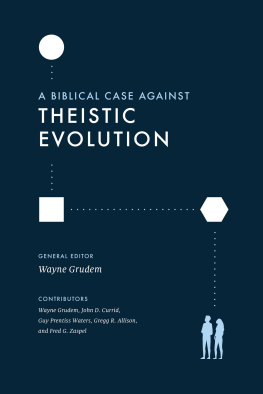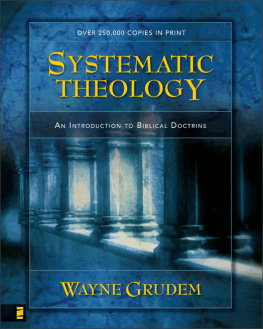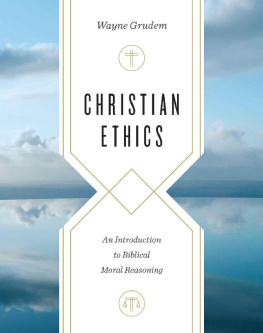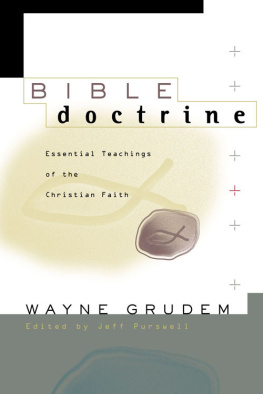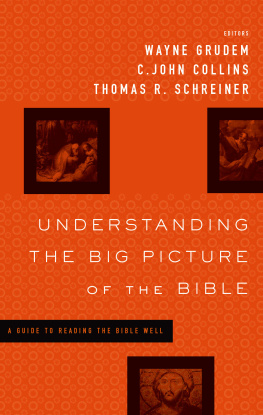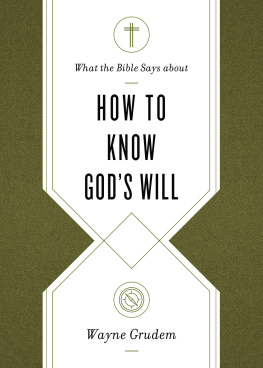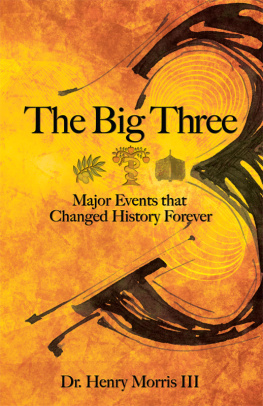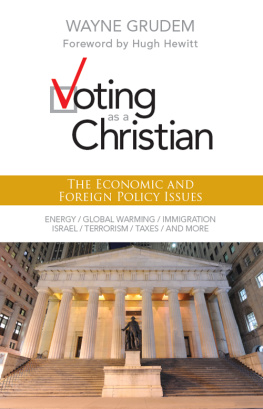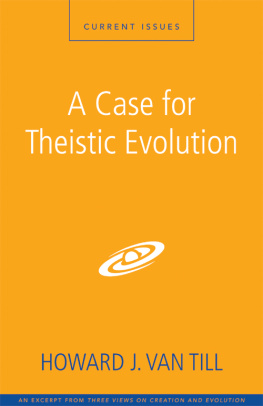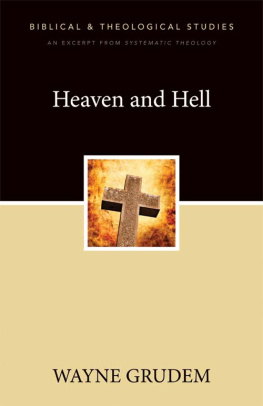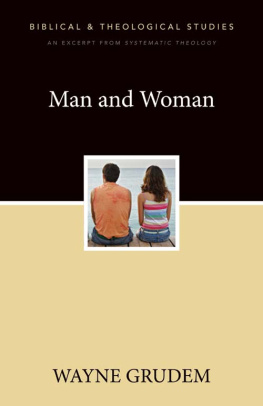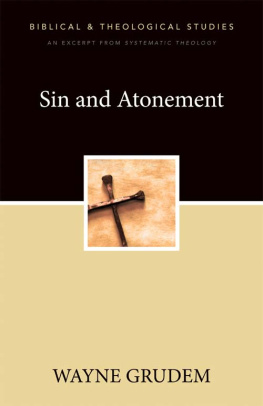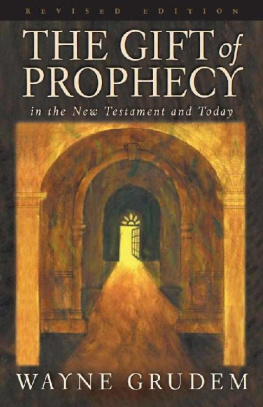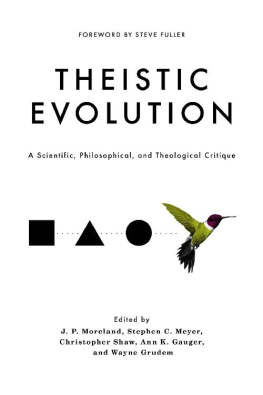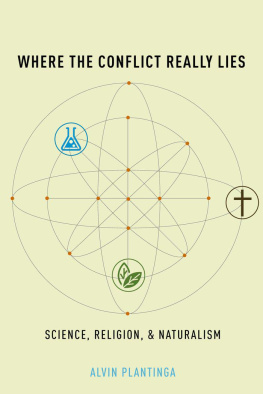Table of Contents
Landmarks
A Biblical Case against Theistic Evolution
Gregg R. Allison (PhD, Trinity Evangelical Divinity School) is Professor of Christian Theology at The Southern Baptist Theological Seminary in Louisville, Kentucky. He is the author of several books, including Historical Theology: An Introduction to Christian Doctrine ; Sojourners and Strangers: The Doctrine of the Church ; Roman Catholic Theology and Practice: An Evangelical Assessment ; Embodied: Living as Whole People in a Fractured World ; and (with Andreas Kstenberger) The Holy Spirit .
John D. Currid (PhD, University of Chicago) is the Chancellor's Professor of Old Testament at Reformed Theological Seminary. He is the author of several books and Old Testament commentaries and has extensive archaeological field experience from projects throughout Israel and Tunisia. His latest book is The Case for Biblical Archaeology: Uncovering the Historical Record of God's Old Testament People .
Wayne Grudem (PhD, University of Cambridge) is Distinguished Research Professor of Theology and Biblical Studies at Phoenix Seminary. He has published more than twenty books, including Systematic Theology , was a translator for the English Standard Version of the Bible, and was the General Editor for the ESV Study Bible . He is a past president of the Evangelical Theological Society.
Guy Prentiss Waters (PhD, Duke University) is the James M. Baird Jr. Professor of New Testament at Reformed Theological Seminary in Jackson, Mississippi. Books he has authored include The Life and Theology of Paul ; For the Mouth of the Lord Has Spoken: The Doctrine of Scripture ; and The Lords Supper as the Sign and Seal of the New Covenant . He also served as senior editor for Crossways Covenant Theology: Biblical, Theological, and Historical Perspectives .
Fred G. Zaspel (PhD, Free University of Amsterdam) is Pastor of Reformed Baptist Church of Franconia, Pennsylvania. He is also the Editor of Books at a Glance and Adjunct Professor of Christian Theology at The Southern Baptist Theological Seminary. His doctoral work was on the theology of Benjamin Breckinridge Warfield, and he has published two books and many articles on Warfield.
Wayne Grudem
Several years ago, the contributors to this book were among the twenty-five authors of a much larger work offering a comprehensive scientific, philosophical, and theological critique of the idea known as theistic evolution. Our contributions to that work focused on the Bible and theology. As we have observed the continued interest in theistic evolution among Christians, we determined that we should publish our chapters in a separate volume focusing on the incompatibility of theistic evolution with several of the most significant teachings of the Bible itself.
The ongoing debate about theistic evolution is not merely a debate about whether Adam and Eve really existed (though it is about that); nor is it merely a debate about some specific details such as whether Eve was formed from one of Adams ribs; nor is it a debate about some minor doctrinal issues over which Christians have differed for centuries.
The debate is about much more than that. From the standpoint of theology, the debate is primarily about the proper interpretation of the first three chapters of the Bible, and particularly whether those chapters should be understood as truthful historical narrative, reporting events that actually happened. This is a question of much significance because those chapters provide the historical foundation for the rest of the Bible and for the entirety of the Christian faith.
That means the debate is also about the validity of several major Christian doctrines for which those three chapters are foundational. In Genesis 13, Scripture teaches essential truths about the activity of God in creation, the origin of the universe, the creation of plants and animals on the earth, the origin and unity of the human race, the creation of manhood and womanhood, the origin of marriage, the origin of human sin and human death, and mans need for redemption from sin.
Without the foundation laid down in those three chapters, the rest of the Bible would make no sense, and many of those doctrines would be undermined or lost. It is no exaggeration to say that those three chapters are essential to the rest of the Bible.
A. What This Book Is Not About
This book is not about the age of the earth. Many Christians hold a young earth position (the earth is no more than ten thousand years old), and many others hold an old earth position (the earth is about 4.5 billion years old). This book does not take a position on that issue, nor do we discuss it at any point in the book.
Furthermore, we did not think it wise to frame the discussion of this book in terms of whether the Bibles teachings about creation should be interpreted literally. That is because, in biblical studies, the phrase literal interpretation is often a slippery expression that can mean a variety of different things. For example, some interpreters take it to refer to a mistaken kind of wooden literalism that would rule out metaphors and other kinds of figurative speech, but that kind of literalism fails to allow for the wide diversity of literature found in the Bible.
In addition, any argument about a literal interpretation of Genesis This book is not concerned with deciding which of these understandings of Genesis 1 is correct, or which ones are properly literal.
Instead, the question is whether Genesis In the following chapters, our argument will be that Genesis 13 should not be understood as primarily figurative or allegorical literature, but should rather be understood as historical narrative, though it is historical narrative with certain unique characteristics.
Finally, this book is not about whether people who support theistic evolution are genuine Christians or are sincere in their beliefs. We do not claim in this book that anyone has carelessly or lightly questioned the truthfulness of Genesis 13. On the contrary, the supporters of theistic evolution with whom we interact give clear indications of being genuine, deeply committed Christians. Their writings show a sincere desire to understand the Bible in such a way that it does not contradict the findings of modern science regarding the origin of living creatures.
But we are concerned that they believe that the theory of evolution is so firmly established that they must accept it as true and must use it as their guiding framework for the interpretation of Genesis 13.
For example, Karl Giberson and Francis Collins write,
The evidence for macroevolution that has emerged in the past few years is now overwhelming. Virtually all geneticists consider that the evidence proves common ancestry with a level of certainty comparable to the evidence that the Earth goes around the sun.
Our goal in this book is to say to our friends who support theistic evolution, and to many others who have not made up their minds about this issue, that the Bible repeatedly presents as actual historical events many specific aspects of the origin of human beings and other living creatures that cannot be reconciled with theistic evolution, and that a denial of those historical specifics seriously undermines several crucial Christian doctrines.
B. A Definition of Theistic Evolution
In brief summary form, then, the theistic evolution that we are respectfully taking issue with is this belief:
God created matter and after that did not guide or intervene or act directly to cause any empirically detectable change in the natural behavior of matter until all living things had evolved by purely natural processes.
This definition is consistent with the explanation of prominent theistic evolution advocates Karl Giberson and Francis Collins:

